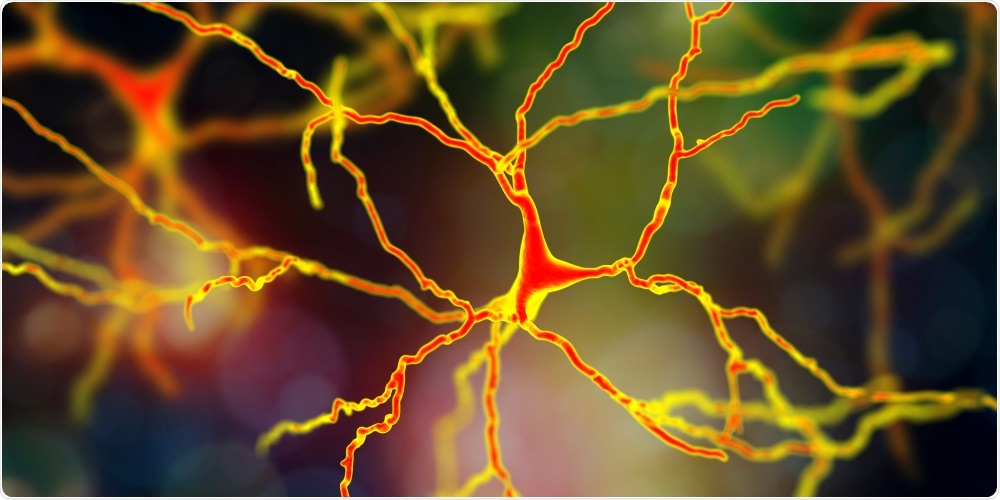The researchers found some evidence that motor neuron disease is linked to an abnormal build-up of cholesterol and other lipids within cellular compartments. However, this could be due to any of a host of abnormal genes.

Image Credit: Kateryna Kon / Shutterstock.com
Motor neuron disease
Motor neuron disease is an umbrella term, with many different types of illness grouped in this category. Amyotrophic lateral sclerosis (ALS) is a fatal disease and the most common MND, affecting about 2 per 100,000 individuals worldwide.
About 1 in 2500 are affected by one of these conditions, in the UK. Their complex symptoms and signs often lead to delayed diagnosis. For instance, the patient might notice it’s becoming harder to climb stairs, or there’s ankle weakness; the speech might become unclear, swallowing becomes a problem, things are dropped more often or the individual finds it difficult to do intricate tasks using the small muscles of the hand. Weight loss due to muscle wasting, and emotional dysregulation, are other noticeable signs at this stage.
Most affected people find this coming on in their 60s and 70s, but no age is exempt after adulthood.
In all cases, the patient eventually becomes unable of any voluntary muscular activity, including moving, talking, swallowing and even breathing, leading to death.
There is no cure at present, nor can the progress of the illness be arrested. Over 2000 deaths occur each year due to this condition, but the cause is still unknown. Some have speculated that it could be due to genetic mutations, heavy metal poisoning or pollutants in agricultural occupations.
The onset, timing and symptoms show gross variation between patients, even when they are genetically related, such as being in the same family. Thus, the new study could help to improve diagnosis and predict the clinical course of the disease, including the severity of the final stages.
Focusing on gene function
The current research mainly deals with spastic paraplegias, one of the subsets of motor neuron disease. Here, the problem is primarily in the motor neuron cells in the upper spinal cord, which communicate with the muscle fibers. The result of such defects in nerve-muscle coordination includes muscle weakness, gross stiffness, and wasting.
For years, we have known that a large number of genes are involved in motor neurone disease, but so far it hasn’t been clear if there’s a common underlying pathway that connects them. Our group’s previous research has identified 13 genes which if altered may cause the condition, and some of these discoveries have proven crucial as the genes we identified are directly involved in the cholesterol processing pathway.”
Andrew Crosby, Lead Author
The Aha! Moment
The discovery that several of these genes take part in cholesterol metabolism led to “a Eureka moment”, as the researchers realized that all the disorders were bound together by the common defect in cholesterol processing within cells. Of course, the question still remains as to whether the cholesterol processing abnormality is the cause or result of the disease, and this will need to be resolved by more study.
In earlier studies, the cholesterol accumulation was noticed but was thought to be the result of neuronal degeneration causing the release of cholesterol from dying cells.
However, lipid droplets have been recognized to be intimately involved in energy homeostasis, or regulating energy supply in the nervous system. Lipid droplets provide fatty acids to the neurons to convert into ATP for the constant cellular energy needs in this vital system. Lipids also affect the relationship between neurons and glial cells, and in the way proteins fold to achieve their functional forms. The elimination of aggregated proteins from the neuron is also dependent on lipid droplets.
The genetic linkage between lipid metabolism and MND has also been noted in previous studies, and this current research will boost further study in this area.
The lack of treatments to slow or arrest motor neuron disease is a difficult situation for both patient and caregiver. Co-researcher Emma Baple says that the current research should help to achieve greater progress in the area of motor neuron disease, eventually leading to better diagnosis and treatment plans – a crucial need in this group of conditions that affects the quality of life of those affected very severely.
Journal reference:
Rickman, O. J., et al. (2019). Lipid metabolic pathways converge in motor neuron degenerative diseases. Brain: a Journal of Neurology. https://doi.org/10.1093/brain/awz382